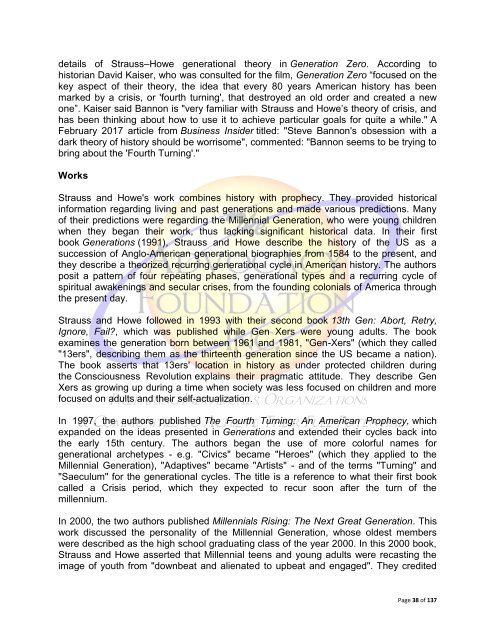Generational Progression
Generational Progression
Generational Progression
Create successful ePaper yourself
Turn your PDF publications into a flip-book with our unique Google optimized e-Paper software.
details of Strauss–Howe generational theory in Generation Zero. According to<br />
historian David Kaiser, who was consulted for the film, Generation Zero “focused on the<br />
key aspect of their theory, the idea that every 80 years American history has been<br />
marked by a crisis, or 'fourth turning', that destroyed an old order and created a new<br />
one”. Kaiser said Bannon is "very familiar with Strauss and Howe’s theory of crisis, and<br />
has been thinking about how to use it to achieve particular goals for quite a while." A<br />
February 2017 article from Business Insider titled: "Steve Bannon's obsession with a<br />
dark theory of history should be worrisome", commented: "Bannon seems to be trying to<br />
bring about the 'Fourth Turning'."<br />
Works<br />
Strauss and Howe's work combines history with prophecy. They provided historical<br />
information regarding living and past generations and made various predictions. Many<br />
of their predictions were regarding the Millennial Generation, who were young children<br />
when they began their work, thus lacking significant historical data. In their first<br />
book Generations (1991), Strauss and Howe describe the history of the US as a<br />
succession of Anglo-American generational biographies from 1584 to the present, and<br />
they describe a theorized recurring generational cycle in American history. The authors<br />
posit a pattern of four repeating phases, generational types and a recurring cycle of<br />
spiritual awakenings and secular crises, from the founding colonials of America through<br />
the present day.<br />
Strauss and Howe followed in 1993 with their second book 13th Gen: Abort, Retry,<br />
Ignore, Fail?, which was published while Gen Xers were young adults. The book<br />
examines the generation born between 1961 and 1981, "Gen-Xers" (which they called<br />
"13ers", describing them as the thirteenth generation since the US became a nation).<br />
The book asserts that 13ers' location in history as under protected children during<br />
the Consciousness Revolution explains their pragmatic attitude. They describe Gen<br />
Xers as growing up during a time when society was less focused on children and more<br />
focused on adults and their self-actualization.<br />
In 1997, the authors published The Fourth Turning: An American Prophecy, which<br />
expanded on the ideas presented in Generations and extended their cycles back into<br />
the early 15th century. The authors began the use of more colorful names for<br />
generational archetypes - e.g. "Civics" became "Heroes" (which they applied to the<br />
Millennial Generation), "Adaptives" became "Artists" - and of the terms "Turning" and<br />
"Saeculum" for the generational cycles. The title is a reference to what their first book<br />
called a Crisis period, which they expected to recur soon after the turn of the<br />
millennium.<br />
In 2000, the two authors published Millennials Rising: The Next Great Generation. This<br />
work discussed the personality of the Millennial Generation, whose oldest members<br />
were described as the high school graduating class of the year 2000. In this 2000 book,<br />
Strauss and Howe asserted that Millennial teens and young adults were recasting the<br />
image of youth from "downbeat and alienated to upbeat and engaged". They credited<br />
Page 38 of 137

















